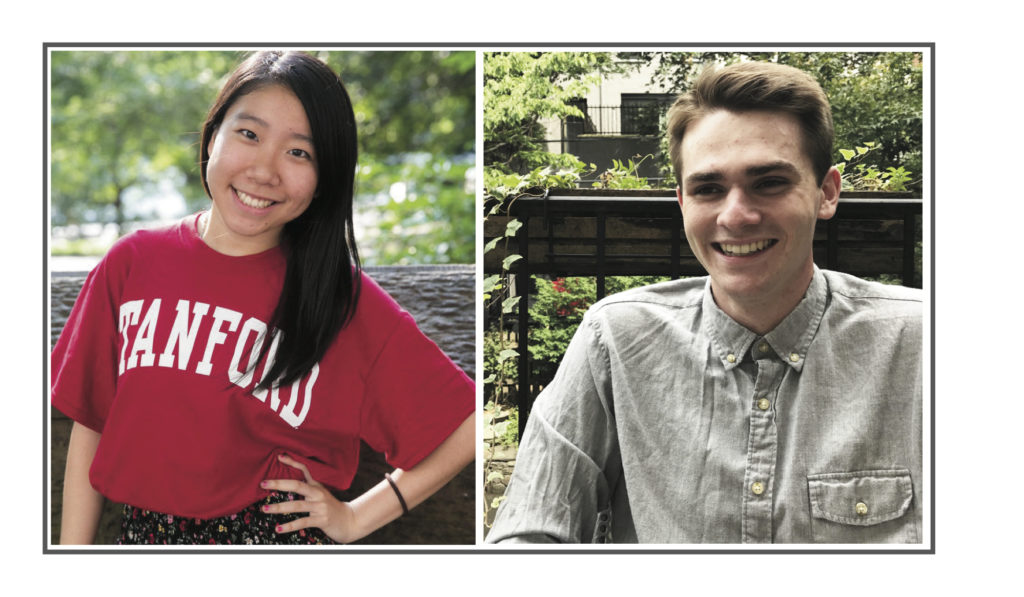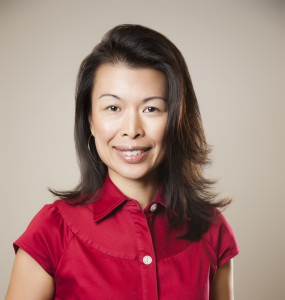Bringing BFS into the Larger World
An Interview with Thomas Chamberlain ’15, Michelle Li ’15, and Terry Kung, Director of College Counseling
It’s not every year that three Brooklyn Friends School alumni graduate from Stanford University but that is exactly happened on June 16, 2019. Thomas Chamberlain, Daisy Feddoes and Michelle Li – all BFS class of 2015 – collected their diplomas at the 128th commencement of the venerable California institution.
Thomas received a Bachelor’s degree in Philosophy and was aproduction and historical archive specialist for Ken Burns’ upcoming PBS documentary Gene, An Intimate History.
Daisy was awarded a B.A. in Psychology and East Asian Studies. She studied abroad at Doshisha University and was an educational intern at the Institution for a Global Society in Tokyo.
Michelle received a B.S. in Mathematical and Computational Science with honors. She was a research assistant at Stanford University School of Medicine and an intern with Genentech.
BFS Journal contributing writer Anita Bushell recently spoke to Terry Kung, Director of College Counseling, as well as Thomas and Michelle about their experience at BFS, the transition to Stanford, and what the future holds for them. (Daisy was unavailable for an interview; we hope to catch up and share her story in the near future.)
What is the implication of these three students graduating from Stanford and what does it mean for BFS?
Terry: The class of 2015 was the very first group of students I worked with at BFS, and the last class to experience our former Upper School space on Willoughby. I hit the ground running as they were knee deep in the college process and they warmly placed their trust in my guidance. The very fact that three unique students with different academic interests ended up calling the same university home was testament to their authentic approach to the application process.
What struck me most was how the Quaker SPICES (simplicity, peace, integrity, community, equality, stewardship) were so organically instilled in our students, including these three. Thomas reminds me of how floored he was when I suggested Stanford as a great match for him. And, Michele and Daisy were similarly modest. When you have three bright examples of BFS students who not only put their best foot forward in the college application process, but in all that they do, the work we collectively do with them is not only rewarding but refreshing and energizing as well.
While we are proud of all of our students and recognize the pure coincidence of these three having chosen Stanford, what stands out most is how their lives have been, and continue to be, shaped by what they learned here at BFS. While we can never fully emulate the world for our students, they can and bring more of BFS into the larger world.
Thomas and Michelle, at what age did you enter BFS?
Thomas: I started at Brooklyn Friends in Kindergarten.
Michelle: I started at the Upper School.
What was your transition to BFS like?
Thomas: I don’t remember much about my transition, since I was very young—I do remember liking the graham crackers they gave us in my kindergarten class.
Michelle: I was very fortunate to meet some incredible girls during the pre-season volleyball practices the summer before my freshman year. They made transitioning into BFS much easier, since we shared similar backgrounds and goals. We were able to help each other with issues in school and at home. I could not have asked for better friends.
What teachers had a profound effect on your experience at BFS?
Thomas: In history, Ed Herzman and Jesse Klausz; in science, Travis Merritt and Kristen Baldiga; and in English, Sidney Bridges.
Michelle: Vladimir Malukoff (my advisor), Julien Remy (my 9th-10th grade dean, 11th-12th grade dean, and IB HL Math teacher), and Vanessa Aird (my faculty advisor for the Panthers Supreme Dance Team) were wonderfully supportive throughout my time at BFS. Not only did Vlad keep me updated every morning with current events, providing historical context where necessary, he always lightened the mood with his banter. Julien never failed to make me feel welcomed at BFS, and it was very fun and challenging (in the best way possible) to be taught by someone who also really loved and had a deep appreciation for math. Vanessa always pushed me to be my best self, both in academics and the Panthers Supreme Dance Team. I believe that her confidence in me made me feel like I could be confident in myself as well.
What advice would you give current students at BFS?
Thomas: I would say don’t worry about what the “right” extra-curricular activities are for getting into college (my mom worries about this a lot). Instead pick things you’re interested in, no matter what they are and really commit to them; in the classroom I would say be curious—ask every question you have and don’t be afraid to keep asking questions if you’re not satisfied with the answer to your first one.
Michelle: Try not to lose sight of the issues/matters that are important to you, whether they be activism, arts, sports, etc. Life is hard enough, so you might as well do more of what brings you joy and/or a sense a purpose. On a more career-oriented standpoint, college admissions really care about you as a contributor to society. Scores and grades matter, but so do your character and potential to be a leader in your field(s).
What’s next, now that you’ve graduated?
Thomas: I’ve spent the summer playing music in Nashville with a band I started in college. Next month I’ll be moving back to NYC and finding work and a place to live.
Michelle: I am currently pursuing a Ph.D. in Biomedical Informatics at Harvard Medical School. I am excited to make use of my love for math and computer science to tackle some of today’s most pressing medical issues, like drug resistance.
Finally, how did the Quaker education you received at BFS prepare and guide you for your studies at Stanford, on a micro and macro level? For example, daily life and challenges, as well as the larger issues of growing up, being away from home, and navigating the world of the university for the first time?
Thomas:I think all the Wednesday afternoons I spent sitting in silence at BFS gave me an appreciation for the importance of being a good listener, and some sense of how to be one. When I first got to college, I was definitely a little intimidated by the academic environment and shy about speaking in class. So I got really good at participating in class, just as a listener first, and that helped make me a better student, classmate and scholar down the road. But maybe more importantly – in my social life – I’ve found that being a good listener has made me a better friend and leader. College is a time of rapid personal growth and change for a lot of people and being a good listener for my friends helped me navigate that personal growth in myself.
Michelle:These are great questions. I had to think about them for a bit. I believe the Quaker education inherently tries to cultivate mindfulness, both towards others and in ourselves. It has certainly helped me put the challenges of college – like navigating through difficult coursework and making new friends – into perspective, so that I would not get as easily overwhelmed. Also, being in the habit of reflecting upon my experiences has kept me grounded, in a way that reminds me to prioritize accordingly. That’s one of the strategies I have used to avoid spreading myself too thin or being too hard on myself for making certain decisions. It doesn’t always work because I am a bit of a workaholic and perfectionist. Now, in terms of being mindful towards others — I really value taking the time to give my closest friends the space they need to vent and actually be listened to, as corny as that sounds. It’s helped me find my closest friends at BFS, whom I still stay in touch with to this day, and at Stanford.
Be curious – ask every question
you have and don’t be afraid
to keep asking questions
if you’re not satisfied
with the answer to your first one. –Thomas
College admissions really care about you as a contributor to society. Scores and grades matter, but so do your character and potential to be a leader in your field. –Michelle
increasing


